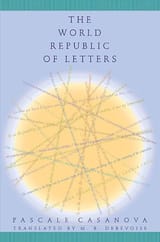Anonymous
7/21/2025, 6:10:13 PM No.24570130
Already shilled this here, but you guys really need to read this. I am almost finished but they way it goes into the mechanisms of literary recognition would help so many of you first year uni students to actually learn how books are born and how classics are made - plus providing in-depth explanations with why you cannot publish your stuff today, which is due to capitalism way more than to women and blacks.
The book includes:
>a history of how the ideas of the most fundamental European national literary traditions develop, citing names, letters, problematizations by authors of various nationalities etc.
>the history of how literature naturally becomes inbred with nation-building by helping establishing "correct" language (the Italian case, the german case, etc.)
>how France comes to establish a literary primacy (something other nations try to catch up with)
>how the historical inheritance of this established literary primacy makes France and specifically Paris a center of "consacration" which establishes its own standard for what constitutes "literature" and validates it in other countries
>how these standards are presented as universal, independent and free when they are very much dependent from historically developed western ideas which were used to gain power in colonial times
>how the perpetuation of this ideas in the literary field factually continued a form of cultural colonialism masked as freedom
>how the anglo-american tradition, after contributing to create some of these standards, began an apparent power struggle with France to make London and New York the new centers of literary legitimations
>how all of this horribly backfires once mass market mentality enters the editing world and suddenly publishing houses decide they should make 15% profit from selling books instead of the solid 4% they gained up to the 1920s
>how the capitalist focus on short term profit applied to publishing houses is single-handedly destroying literature by increasing (more than any time in history) the amounts of books published, while at the same time significantly shortening the amount of time they kept on bookshelves and sold - because this apparently makes the more money
>how this kind of market is now getting to shape the anglo-american and thus global perception of non-american countries by selling in mass anglo-american-compatible versions of foreign narratives, i.e. books from foreigners that already fit the existing anglo-american mass market for books
>how this is creating an increasingly inbred environment of inbred narratives and pretending it is "world literature", when it is in fact its literally opposite
Of course, the book explains it better than I did - but it's giving me so much insight into concepts and ideas that were only half-baked in my head up to now.
The book includes:
>a history of how the ideas of the most fundamental European national literary traditions develop, citing names, letters, problematizations by authors of various nationalities etc.
>the history of how literature naturally becomes inbred with nation-building by helping establishing "correct" language (the Italian case, the german case, etc.)
>how France comes to establish a literary primacy (something other nations try to catch up with)
>how the historical inheritance of this established literary primacy makes France and specifically Paris a center of "consacration" which establishes its own standard for what constitutes "literature" and validates it in other countries
>how these standards are presented as universal, independent and free when they are very much dependent from historically developed western ideas which were used to gain power in colonial times
>how the perpetuation of this ideas in the literary field factually continued a form of cultural colonialism masked as freedom
>how the anglo-american tradition, after contributing to create some of these standards, began an apparent power struggle with France to make London and New York the new centers of literary legitimations
>how all of this horribly backfires once mass market mentality enters the editing world and suddenly publishing houses decide they should make 15% profit from selling books instead of the solid 4% they gained up to the 1920s
>how the capitalist focus on short term profit applied to publishing houses is single-handedly destroying literature by increasing (more than any time in history) the amounts of books published, while at the same time significantly shortening the amount of time they kept on bookshelves and sold - because this apparently makes the more money
>how this kind of market is now getting to shape the anglo-american and thus global perception of non-american countries by selling in mass anglo-american-compatible versions of foreign narratives, i.e. books from foreigners that already fit the existing anglo-american mass market for books
>how this is creating an increasingly inbred environment of inbred narratives and pretending it is "world literature", when it is in fact its literally opposite
Of course, the book explains it better than I did - but it's giving me so much insight into concepts and ideas that were only half-baked in my head up to now.
Replies:
